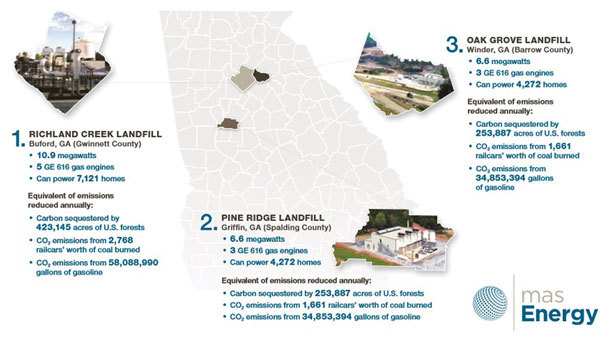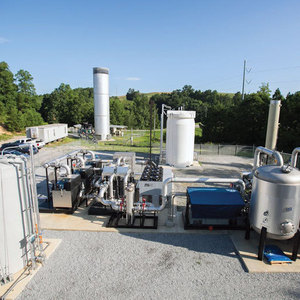Mas-tering Landfill Gas Multiples







PHOTO: MAS ENERGY
August 24, 2016
BY Anna Simet
Mas Energy is proof that with the right expertise and experience, a small team of individuals can make big things happen. The Georgia-based company, focused on renewable and clean energy projects, and partner Republic Services, just brought online a 24.5-MW, three-landfill biogas-to-energy project in the metro Atlanta area. Mostly involved in small- and medium-scale biomass, biogas and combined-heat-and-power (CHP) projects—for example, a 6.W-MW CHP system that services Coca-Cola’s Atlanta Syrup Plant—Mas Energy typically takes on the entire spectrum of development responsibilities, from initial development to to commercialization and operations, according to Michael Hall, principal and chief development officer, “The majority of our team is made up of engineers with business or finance backgrounds,” he tells Biomass Magazine.
Its most recently completed landfill gas-to-energy project consists of Republic Services Buford, Griffin and Winder landfills, all located in the metro Atlanta area. The Winder and Griffin sites each host three GE Jenbacher engines and Buford has five, all supplied by Nixon Energy, which is responsible for daily operations and maintenance. “The uniqueness about these projects, and what ties them all together, are that all three are identical in design, with the exception of one site having five engines,” Hall says. “We went above and beyond to standardize our project design to be efficient with spare parts and operations and maintenance—we spent some extra capital to make sure we have a very sustainable project long-term.”
Hall points out that the offtake agreement with Georgia Power was separated into smaller, but same-term power purchase agreements to accommodate each of the sites. “We negotiated all of the project terms in parallel, and constructed all sites in parallel,” he says.
On the permitting process, Mas Energy knows the ropes in Georgia, where Hall says regulators are “very pro-business, but also take appropriate actions for protecting the environment and community. They don’t cut corners, but they are very responsive,” he says, adding that from application submittal to permit awarding, it took about 100 days. One strategy for expediting the process, according to Hall, is that Mas Energy self-elects to install post-combustion treatment to ensure a smoother permitting process. “We permitted these projects as what are called Synthetic Minors, which means we install equipment to keep emission levels below major permit thresholds for the city of Atlanta,” he says. “Places like California have stricter emissions policies and more challenging processes, but we have a good working relationship with the Georgia Environmental Protection Department, and we understand their permitting process well.”
As for future projects in the landfill gas market, Hall says it’s slowed from the pace the industry was growing at five or six years ago, as a result of depressed natural gas prices, but there are still some bright spots, such as high-Btu projects. “That market seems to be very active at the moment,” he adds. “We’re yet to develop a project like that, but we know others who are very active in that market sector. We’re just looking for the right opportunities.”
Author: Anna Simet
Managing Editor, Biomass Magazine
asimet@bbiinternational.com
701-738-4962
Advertisement
Advertisement
Upcoming Events





